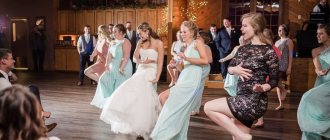Biography of Tatyana Mitkova
TV presenter Tatyana Mitkova was born in Moscow on September 13, 1957. Father - Rostislav Leonidovich, an officer in the Soviet army, went through the entire war. He took part in the battles near Kursk and near Moscow, and after the war he served in foreign intelligence. The mother, who served at the Swiss embassy, devoted herself entirely to her family after the birth of her child. Returning to their homeland, the parents sent their daughter to the best Moscow school with a focus on English. Noticing the girl’s increased interest in music, they enrolled her in a music school.
Tatyana was good at humanitarian subjects , but had difficulties with mathematics and physics. She danced and attended the figure skating section. Her parents wanted to see her as a student at the conservatory, but she chose a different profession for herself. After school, I entered a two-year course for young journalists, then entered the Faculty of Journalism of Moscow State University in the evening department. While still studying, while doing practical work at Ostankino, she decided that she would work here. In 1982, she successfully completed her studies and came to the CT as a certified specialist.
Her career quickly took off, many of her classmates were jealous of her. I came to CT as an intern. At first she was an assistant editor, then became a senior editor, and soon became a special correspondent. She had many more pleasant events, honorary appointments and government awards ahead of her.
But, to give her credit, she achieved all this herself, thanks to her perseverance and persistent character.
Young Tatyana took her first test of honesty and integrity in 1991, when she hosted a news program, and she had to read out an official review of the January events in Vilnius. Knowing the true state of affairs, Mitkova refused to read it, and they had to call another announcer.
She was fired, but in the fall of the same year she was awarded the prize “For highly professional performance of journalistic duty.”
Tatyana Mitkova now
Tatyana Mitkova holds the post of editor-in-chief of the NTV Information Service and the post of deputy general director of JSC NTV Television Company. Once again disappearing from the air in 2014, the television journalist broke her silence in 2021. In the “Tonight” program, called “Tatiana’s Day,” Tatyana Mitkova, Tatyana Vedeneeva, Tatyana Sudets recalled their first steps on television.
In the same year, Mitkova released a film dedicated to the centenary of the Soviet jazzman “NTV Vision: Oleg Lundstrem. Life in the jazz style." In 2017, the television journalist presented to the public another biographical project, “NTV Vision: Muslim Magomayev. Return,” which was created by Tamara Sinyavskaya, Marina Magomaeva-Kozlovskaya, Roberto Loreti, Vladimir Atlantov, Farhad Khalilov and Farhad Badalbeyli. According to the journalist, she is interested in the era of the 50-90s of the last century, as well as the fate of the great personalities who lived in those years.
Television career
As you can see, our heroine’s career as a journalist and TV presenter began during her student years. After her dismissal, Tatyana worked for some time in hot spots for the German company ARD, and in August 1991 she returned to Channel One in Ostankino and began hosting the Vremya and Novosti programs. I often posted poignant stories.
V. Mukusev recalls how in 1987 he came from Afghanistan with material that would hardly have been officially missed: the report was related to the withdrawal of our troops. The topic was taboo, but Mitkova provided material to the International Panorama at her own peril and risk. There was a big scandal, she was severely reprimanded, but not fired. In 1988, Tatyana was invited to present international news on everyone’s favorite Good Morning program.
TELEVISION CAREER
0
While still at the institute, during an internship, the girl ended up in Ostankino. At first she worked as an assistant editor, and later became a special correspondent. The first programs of the aspiring journalist were “International Panorama” and “120 Minutes”.

0
At that time, there was strict censorship in the media, and Tatyana was responsible for preparing the material. If his coverage went beyond what was permitted, reprimands from management followed. According to the recollections of colleagues, there was a big scandal when, in a message about the Falklands conflict on their channel, there were notes of sympathy for the British, since the propaganda focused exclusively on condemning Britain and the United States (then Argentina seized the Malvinas Islands, which belonged to the United Kingdom, and Thatcher sent warships on its shores).
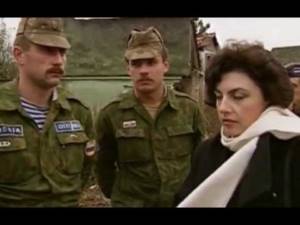
0
The young editor Mitkova also had some scoldings in the case of the information about Afghanistan that was broadcast and called for the withdrawal of our troops. Even such hints were unacceptable then.
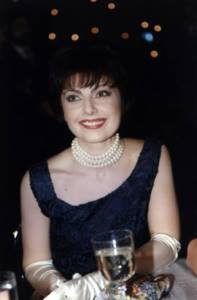
0
In 1990, at the age of 33, the television journalist became the presenter of the Television News Service. In 1991, she was forced to leave Ostankino (according to some sources, she was fired) due to her refusal to read the official version of the state news agency about the January events in the Lithuanian capital.
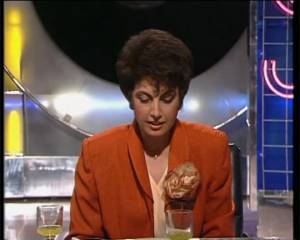
0
Then for several months she collaborated with ARD, the public television and radio company of the Federal Republic of Germany, then returned and began to host information and news programs “Time”, “News”, and made sharp stories, in particular, about the close cooperation of high clergy with the KGB.
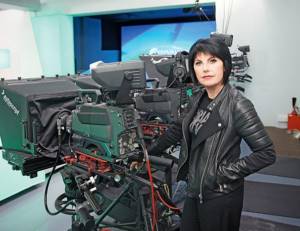
0
The famous Nikita Mikhalkov then stood up to defend the hierarchs. He challenged her to a dialogue in “Crossroads”. Mitkova avoided discussing the issue under the pretext of her son’s illness. Then the film director came with a cameraman straight to her apartment. But she again refused to discuss. As a result, in the film he shot, he accused the TV diva of lying.
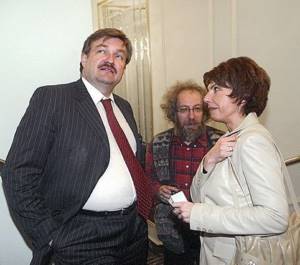
0
In 1993, the television journalist began working for NTV. She became the “face” of the “Today” program. In 2001, when there was a split in the creative team of the television company, Mitkova did not support the majority and the head Evgeniy Kiselyov, who left (along with “freedom of speech” and many television viewers). Despite the dramatic events, she remained on the channel and took over the post of the departed Kiselev, temporarily disappearing from television screens.
Personal life
Mitkova Tatyana Rostislavovna is not used to flaunting her personal life ; even her work partners do not know about her relationships with men. It is only known that she was married twice. Her first husband was international journalist Vsevolod Borisovich Soloviev, they have a common son, Dmitry. There is a grandson Sev, whom his grandmother loves very much and tries to spend as much time with him as possible. He, like her, is also interested in skiing, and they often go on vacation together.
According to some reports, she had a romantic relationship with Evgeny Kiselyov at the very time when Vsevolod was on a long business trip in one of the African countries. It was then that the spouses moved away from each other, and soon separated completely. It is known about the TV star’s second husband that he is engaged in financial transactions on the stock exchange. In interviews with journalists, she usually says that she has a good family, a loving husband who understands her and supports her in everything.
Mitkova - real surname or a successful pseudonym
At one time there were many rumors regarding the real name of the popular TV presenter. According to her fellow journalists, Tatyana’s real name is Mitkova. But the girl didn’t like the way it sounded, so the soft sign was simply removed.
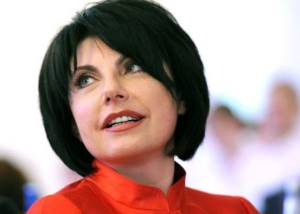
Photo taken from open sources
According to the second version, the initiative to change the name came from Tanya’s relatives. Allegedly, her grandfather had noble roots, and changed his last name to Mitkov in order to get rid of persecution during the Stalinist repressions. Which option sounds more plausible is up to you to decide.
Excerpt characterizing Mitkova, Tatyana Rostislavovna
At that moment, as the cavalry guards, having passed him, disappeared into the smoke, Rostov hesitated whether to gallop after them or go where he needed to go. This was that brilliant attack of the cavalry guards, which surprised the French themselves. Rostov was scared to hear later that out of all this mass of huge handsome people, out of all these brilliant, rich young men, officers and cadets riding thousands of horses, galloping past him, only eighteen people remained after the attack. “Why should I envy, what is mine will not go away, and now, perhaps, I will see the sovereign!” thought Rostov and rode on. Having caught up with the guards infantry, he noticed that cannonballs were flying through and around them, not so much because he heard the sound of cannonballs, but because he saw concern on the faces of the soldiers and unnatural, warlike solemnity on the faces of the officers. Driving behind one of the lines of infantry guard regiments, he heard a voice calling him by name. - Rostov! - What? – he responded, not recognizing Boris. - What is it like? hit the first line! Our regiment went on the attack! - said Boris, smiling that happy smile that happens to young people who have been on fire for the first time. Rostov stopped. - That's how it is! - he said. - Well? - They recaptured! - Boris said animatedly, having become talkative. - You can imagine? And Boris began to tell how the guard, having taken their place and seeing the troops in front of them, mistook them for Austrians and suddenly learned from the cannonballs fired from these troops that they were in the first line, and unexpectedly had to take action. Rostov, without listening to Boris, touched his horse. - Where are you going? – asked Boris. - To His Majesty with an errand. - Here he is! - said Boris, who heard that Rostov needed His Highness, instead of His Majesty. And he pointed him to the Grand Duke, who, a hundred paces away from them, in a helmet and a cavalry guard's tunic, with his raised shoulders and frowning eyebrows, was shouting something to the white and pale Austrian officer. “But this is the Grand Duke, and I’m going to the commander-in-chief or the sovereign,” said Rostov and started to move his horse. - Count, count! - shouted Berg, as animated as Boris, running up from the other side, - Count, I was wounded in my right hand (he said, showing his hand, bloody, tied with a handkerchief) and remained in the front. Count, holding a sword in my left hand: in our race, the von Bergs, Count, were all knights. Berg said something else, but Rostov, without listening to him, had already moved on. Having passed the guards and an empty gap, Rostov, in order not to fall into the first line again, as he came under attack by the cavalry guards, rode along the line of reserves, going far around the place where the hottest shooting and cannonade was heard. Suddenly, in front of him and behind our troops, in a place where he could not possibly suspect the enemy, he heard close rifle fire. "What could it be? - thought Rostov. - Is the enemy behind our troops? It can’t be, Rostov thought, and a horror of fear for himself and for the outcome of the entire battle suddenly came over him. “Whatever it is, however,” he thought, “there’s nothing to go around now.” I must look for the commander-in-chief here, and if everything is lost, then it’s my job to perish along with everyone else.” The bad feeling that suddenly came over Rostov was confirmed more and more the further he drove into the space occupied by crowds of heterogeneous troops, located beyond the village of Prats. - What's happened? What's happened? Who are they shooting at? Who's shooting? - Rostov asked, matching the Russian and Austrian soldiers running in mixed crowds across his road. - The devil knows them? Beat everyone! Get lost! - the crowds of people running and not understanding, just like him, what was happening here, answered him in Russian, German and Czech. - Beat the Germans! - one shouted. - Damn them - traitors. “Zum Henker diese Ruesen... [To hell with these Russians...],” the German grumbled something. Several wounded were walking along the road. Curses, screams, moans merged into one common roar. The shooting died down and, as Rostov later learned, Russian and Austrian soldiers were shooting at each other. "My God! what is this? - thought Rostov. - And here, where the sovereign can see them at any moment... But no, these are probably just a few scoundrels. This will pass, this is not it, this cannot be, he thought. “Just hurry up, pass them quickly!” The thought of defeat and flight could not enter Rostov’s head. Although he saw French guns and troops precisely on Pratsenskaya Mountain, on the very one where he was ordered to look for the commander-in-chief, he could not and did not want to believe it. Near the village of Praca, Rostov was ordered to look for Kutuzov and the sovereign. But here not only were they not there, but there was not a single commander, but there were heterogeneous crowds of frustrated troops. He urged his already tired horse to get through these crowds as quickly as possible, but the further he moved, the more upset the crowds became. The high road on which he drove out was crowded with carriages, carriages of all kinds, Russian and Austrian soldiers, of all branches of the military, wounded and unwounded. All this hummed and swarmed in a mixed manner to the gloomy sound of flying cannonballs from the French batteries placed on the Pratsen Heights. - Where is the sovereign? where is Kutuzov? - Rostov asked everyone he could stop, and could not get an answer from anyone. Finally, grabbing the soldier by the collar, he forced him to answer himself. - Eh! Brother! Everyone has been there for a long time, they have fled ahead! - the soldier said to Rostov, laughing at something and breaking free. Leaving this soldier, who was obviously drunk, Rostov stopped the horse of the orderly or the guard of an important person and began to question him. The orderly announced to Rostov that an hour ago the sovereign had been driven at full speed in a carriage along this very road, and that the sovereign was dangerously wounded. “It can’t be,” said Rostov, “that’s right, someone else.” “I saw it myself,” said the orderly with a self-confident grin. “It’s time for me to know the sovereign: it seems like how many times I’ve seen something like this in St. Petersburg.” A pale, very pale man sits in a carriage. As soon as the four blacks let loose, my fathers, he thundered past us: it’s time, it seems, to know both the royal horses and Ilya Ivanovich; It seems that the coachman does not ride with anyone else like the Tsar. Rostov let his horse go and wanted to ride on. A wounded officer walking past turned to him. -Who do you want? – asked the officer. - Commander-in-Chief? So he was killed by a cannonball, killed in the chest by our regiment. “Not killed, wounded,” another officer corrected. - Who? Kutuzov? - asked Rostov. - Not Kutuzov, but whatever you call him - well, it’s all the same, there aren’t many alive left. Go over there, to that village, all the authorities have gathered there,” said this officer, pointing to the village of Gostieradek, and walked past. Rostov rode at a pace, not knowing why or to whom he would go now. The Emperor is wounded, the battle is lost. It was impossible not to believe it now. Rostov drove in the direction that was shown to him and in which a tower and a church could be seen in the distance. What was his hurry? What could he now say to the sovereign or Kutuzov, even if they were alive and not wounded? “Go this way, your honor, and here they will kill you,” the soldier shouted to him. - They'll kill you here! - ABOUT! what are you saying! said another. -Where will he go? It's closer here. Rostov thought about it and drove exactly in the direction where he was told that he would be killed. “Now it doesn’t matter: if the sovereign is wounded, should I really take care of myself?” he thought. He entered the area where most of the people fleeing from Pratsen died. The French had not yet occupied this place, and the Russians, those who were alive or wounded, had long abandoned it. On the field, like heaps of good arable land, lay ten people, fifteen killed and wounded on every tithe of space. The wounded crawled down in twos and threes together, and one could hear their unpleasant, sometimes feigned, as it seemed to Rostov, screams and moans. Rostov started to trot his horse so as not to see all these suffering people, and he became scared. He feared not for his life, but for the courage that he needed and which, he knew, would not withstand the sight of these unfortunates. The French, who stopped shooting at this field strewn with the dead and wounded, because there was no one alive on it, saw the adjutant riding along it, aimed a gun at him and threw several cannonballs. The feeling of these whistling, terrible sounds and the surrounding dead people merged for Rostov into one impression of horror and self-pity. He remembered his mother's last letter. “What would she feel,” he thought, “if she saw me now here, on this field and with guns pointed at me.” In the village of Gostieradeke there were, although confused, but in greater order, Russian troops marching away from the battlefield. The French cannonballs could no longer reach here, and the sounds of firing seemed distant. Here everyone already saw clearly and said that the battle was lost. Whoever Rostov turned to, no one could tell him where the sovereign was, or where Kutuzov was. Some said that the rumor about the sovereign’s wound was true, others said that it was not, and explained this false rumor that had spread by the fact that, indeed, the pale and frightened Chief Marshal Count Tolstoy galloped back from the battlefield in the sovereign’s carriage, who rode out with others in the emperor’s retinue on the battlefield. One officer told Rostov that beyond the village, to the left, he saw someone from the higher authorities, and Rostov went there, no longer hoping to find anyone, but only to clear his conscience before himself. Having traveled about three miles and having passed the last Russian troops, near a vegetable garden dug in by a ditch, Rostov saw two horsemen standing opposite the ditch. One, with a white plume on his hat, seemed familiar to Rostov for some reason; another, unfamiliar rider, on a beautiful red horse (this horse seemed familiar to Rostov) rode up to the ditch, pushed the horse with his spurs and, releasing the reins, easily jumped over the ditch in the garden. Only the earth crumbled from the embankment from the horse’s hind hooves. Turning his horse sharply, he again jumped back over the ditch and respectfully addressed the rider with the white plume, apparently inviting him to do the same. The horseman, whose figure seemed familiar to Rostov and for some reason involuntarily attracted his attention, made a negative gesture with his head and hand, and by this gesture Rostov instantly recognized his lamented, adored sovereign. “But it couldn’t be him, alone in the middle of this empty field,” thought Rostov. At this time, Alexander turned his head, and Rostov saw his favorite features so vividly etched in his memory. The Emperor was pale, his cheeks were sunken and his eyes sunken; but there was even more charm and meekness in his features. Rostov was happy, convinced that the rumor about the sovereign’s wound was unfair. He was happy that he saw him. He knew that he could, even had to, directly turn to him and convey what he was ordered to convey from Dolgorukov. But just as a young man in love trembles and faints, not daring to say what he dreams of at night, and looks around in fear, looking for help or the possibility of delay and escape, when the desired moment has come and he stands alone with her, so Rostov now, having achieved that , what he wanted more than anything in the world, did not know how to approach the sovereign, and he was presented with thousands of reasons why it was inconvenient, indecent and impossible. "How! I seem to be glad to take advantage of the fact that he is alone and despondent. An unknown face may seem unpleasant and difficult to him at this moment of sadness; Then what can I tell him now, when just looking at him my heart skips a beat and my mouth goes dry?” Not one of those countless speeches that he, addressing the sovereign, composed in his imagination, came to his mind now. Those speeches were mostly held under completely different conditions, they were spoken for the most part at the moment of victories and triumphs and mainly on his deathbed from his wounds, while the sovereign thanked him for his heroic deeds, and he, dying, expressed his love confirmed in fact my. “Then why should I ask the sovereign about his orders to the right flank, when it is already 4 o’clock in the evening and the battle is lost? No, I definitely shouldn’t approach him. Shouldn't disturb his reverie. It’s better to die a thousand times than to receive a bad look from him, a bad opinion,” Rostov decided and with sadness and despair in his heart he drove away, constantly looking back at the sovereign, who was still standing in the same position of indecision. While Rostov was making these considerations and sadly driving away from the sovereign, Captain von Toll accidentally drove into the same place and, seeing the sovereign, drove straight up to him, offered him his services and helped him cross the ditch on foot. The Emperor, wanting to rest and feeling unwell, sat down under an apple tree, and Tol stopped next to him. From afar, Rostov saw with envy and remorse how von Tol spoke to the sovereign for a long time and with fervor, and how the sovereign, apparently crying, closed his eyes with his hand and shook hands with Tol. “And I could be in his place?” Rostov thought to himself and, barely holding back tears of regret for the fate of the sovereign, in complete despair he drove on, not knowing where and why he was going now.
Tatyana Mitkova: Two husbands, the fate of the only son and beloved grandson
Tatyana Rostislavovna Mitkova is a famous TV presenter and journalist, who last fall celebrated two milestones at once - her 65th anniversary and 40 years of work on television.
Our heroine began her professional career during the Moscow Olympics-80, when immediately after graduating from the Faculty of Journalism she was accepted as an assistant director, and after a short time she became a correspondent for the information program “Time”.
Tatyana has been a goal-oriented person since childhood. At school, foreign languages were easy for her, she read a lot, and also attended a music school to study piano.
She was born in the capital, in the family of a military man - a foreign intelligence officer and an embassy employee. The parents dreamed of their daughter becoming a musician, but this was not part of Tatyana’s plans.
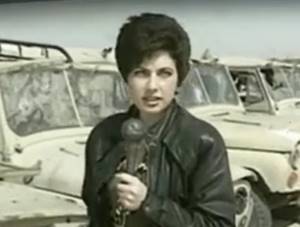
at the beginning of his career
The girl became seriously interested in journalism and in high school she transferred to a school with a specialized focus. Then she entered Moscow State University without any hassle, but she had no intention of being dependent on her parents.
Tatyana transferred to evening classes and got a job. Her career developed rapidly. From a correspondent and presenter of news programs to deputy general director of the federal channel NTV.
The peak of Mitkova’s career came in the early nineties, when, together with her colleagues Alexander Gurnov, Mikhail Osokin, Dmitry Kiselev and others, Tatyana was the presenter of the Television News Service.
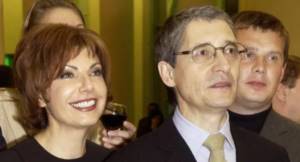
with colleague Mikhail Osokin
Mitkova always had a strong and decisive character, she defended her position to the end, no matter what the cost.
So many TV viewers probably remember how, after Vladislav Flyarkovsky, who filmed a program with the scandalous showman Nikita Dzhigurda, was fired from Channel One, Tatyana quit out of solidarity with her colleague.
Mitkova was later fired from TSN when she refused to cover live the January 1991 events in the capital of Lithuania. The official point of view did not coincide with her personal position, and Mitkova asked her fellow announcer to read the text.
Lately, Mitkova has not appeared on our TV screens so often. She has made several documentaries, and currently holds the post of head of the broadcasting directorate of the NTV channel.
As for the real name of our heroine. There are two legends here.
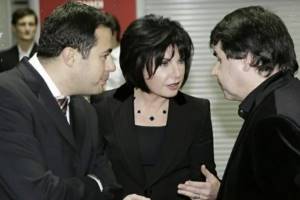
According to one of them, Tatyana did not like her real one - “Mitkova”, and she “got rid of” the soft sign. According to another, the initiative came from her grandfather, who had noble roots and during the Stalinist repressions was afraid of persecution, and therefore replaced her.
In the journalist’s personal life there were two marriages. Tatyana met her first husband immediately after graduating from university.
Her heart was won by a colleague named Vsevolod Solovyov, who was an international journalist. In this union, Tatyana had a son, who decided not to follow in the footsteps of his parents, but became a professional photographer.
His name is Dmitry. He has been happily married for a long time and gave Tatyana Rostislavovna a grandson, Sev. Grandmother adores her heir and spends a lot of time with him. Currently, Tatyana is in her second marriage. She carefully hides her husband’s name, and in one of her interviews she shared information that his type of activity is related to the banking sector. Do you like Tatyana Mitkova?
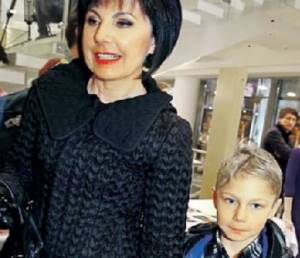
with grandson
Awards
Tatyana Mitkova has received numerous awards in the field of journalism. The most valuable can be considered the TEFI figurine in the category “Best News Program Presenter.” She also has the Order of Friendship and “For Services to the Fatherland.”
Other awards:
- Moscow Prize in Journalism;
- Winner of “TV-inform” - presenter competition;
- Award for Excellence in Journalism, established by the American Organization for the Defense of Journalists;
- The Olympia Prize recognizes the achievements of women.
But Tatyana Mitkova, by her own admission, does not like to rest. As a matter of principle, she does not go to foreign resorts, preferring to spend her free time in the Moscow region. He is interested in music and raises his son Dmitry.
Journalism
During her college years, during her internship, the young journalist ended up in Ostankino. Tatyana Mitkova's television biography began as an assistant editor. Soon the girl was appointed a special correspondent. Tatyana was involved in the television projects “International Panorama” and “120 Minutes”. The TV presenter also appeared in episodes of the information and entertainment program “Good Morning,” which has been broadcast on Central Television since 1986.
Tatyana Mitkova
As Tatyana Mitkova later recalled on the “Tonight” program, in those years, mistakes during the broadcast were severely punished. This is how Vladislav Flyarkovsky was fired in 1989. Together with Mitkova, on Good Morning, the journalist interviewed Nikita Dzhigurda, who was already considered a shocking and unpredictable artist in those years. The TV presenters asked Nikita to sing something from the repertoire. Suddenly, a ditty about Raisa Maksimovna Gorbacheva came from the actor’s lips. A scandal and the removal of Flyarkovsky followed. Tatyana Mitkova left the program as a sign of solidarity with the co-host.
Tatyana Mitkova in the “Today” program
According to some information, after leaving Ostankino, Mitkova collaborated with the German television company ARD. But soon Tatyana returned and began hosting the news programs “Vremya” and “News”. The most sensational story of that period was Tatyana Rostislavovna’s story about the secret cooperation of the KGB and senior clergy of the Orthodox Church. Nikita Mikhalkov then volunteered to enter into an argument with the TV presenter, but Mitkova avoided the discussion.
Journalist Tatyana Mitkova
In 1993, Tatyana Mitkova appeared on NTV. Soon the journalist became the face of the “Today” program. But in 2001, there was a split in the channel’s team. The TV presenter found herself on the side of the minority, not supporting the head of the channel, Evgeniy Kiselyov. After Kiselev left, Mitkova returned to NTV and took his place.
- “Millionaire husband, no children at 53.” Woman in politics - Tatyana Golikova
In 2011, Mitkova returned to the screens as the host of the “Today” program. Results,” while remaining in the position of head of the information broadcasting service. Tatyana Rostislavovna led the program until 2014.
Tatyana Mitkova in the NTV studio
In the same year, Mitkova demonstratively refused the medal, which the Lithuanian government wanted to give her as gratitude in memory of the events of 1991, when the journalist had the courage to refuse to publicize the official position of the Russian authorities about what happened in Vilnius. Tatyana Mitkova explained this by disagreement with the position of Dalia Grbauskaite, who excluded Dmitry Kiselev, who was subject to EU sanctions, from the award list.
Mitkova has many awards, including TEFI and the Order of Merit for the Fatherland. Many colleagues today respect Tatyana for her professionalism and talent, but there are also those who believe that the journalist broke down and began to cooperate with the authorities.
Projects
- 1990-1991 – news releases of the Television News Service (TSN) of the Central Television of the USSR
- 1991-1993 – “Daily News” on Channel 1
- 1993-2004 – “Today” on NTV
- 2011-2014 – “Today. Results" on NTV
- 2016 – “NTV Vision: Oleg Lundstrem. Life in the jazz style"
- 2017 – “NTV Vision: Muslim Magomayev. Return"
Sources used:
- Tatyana Vedeneeva: biography, personal life, family, husband, children - photo
- https://uznayvse.ru/znamenitosti/biografiya-tatyana-mitkova.html
- https://24smi.org/celebrity/3245-tatiana-mitkova.html





